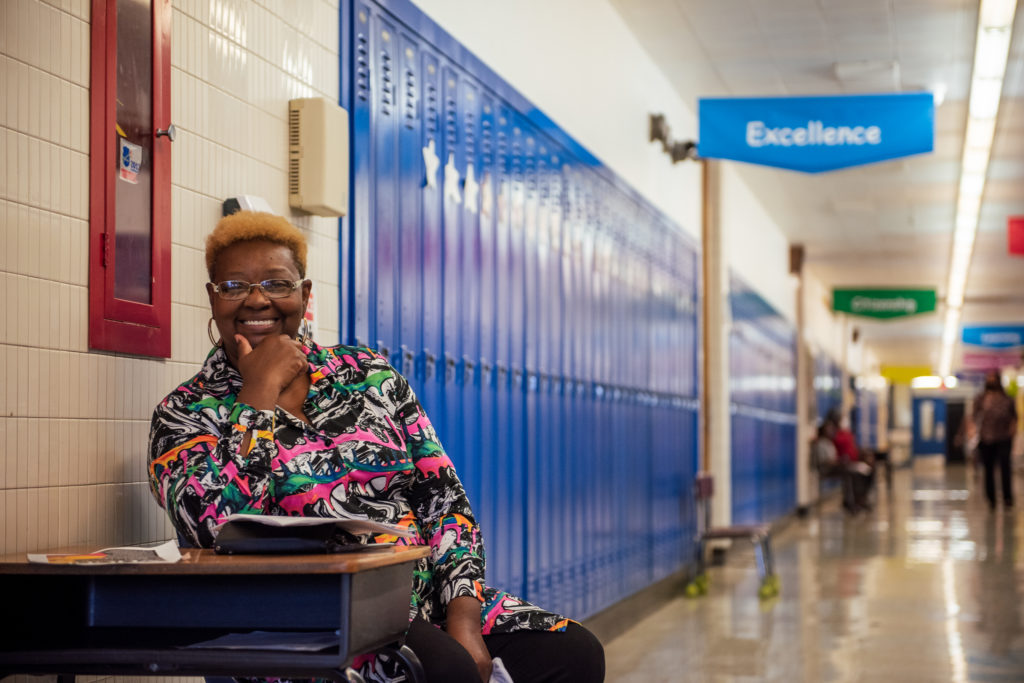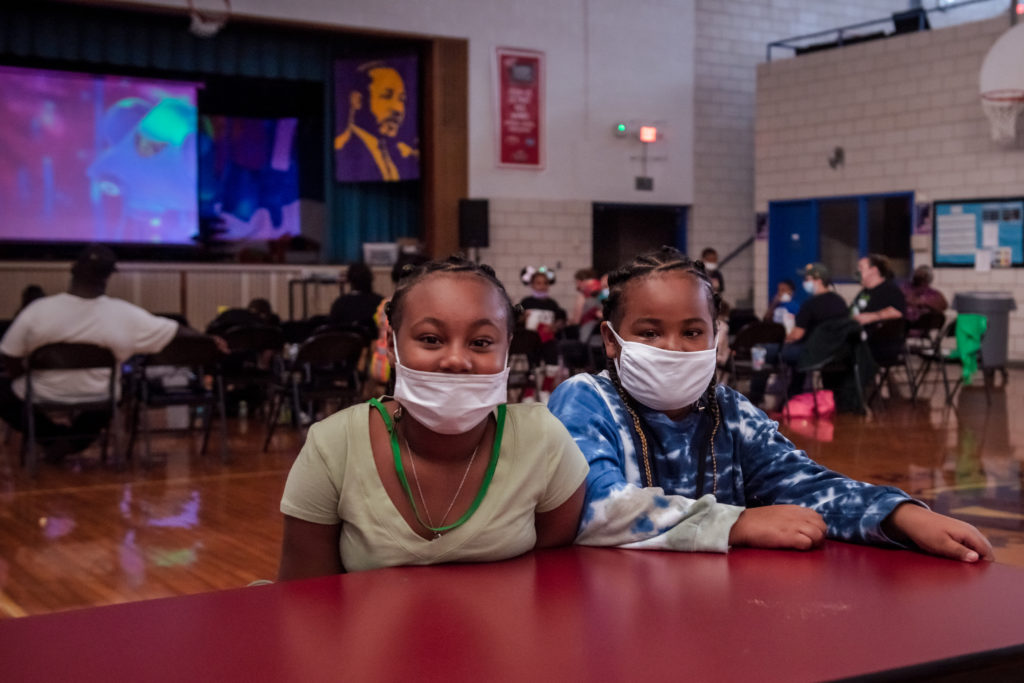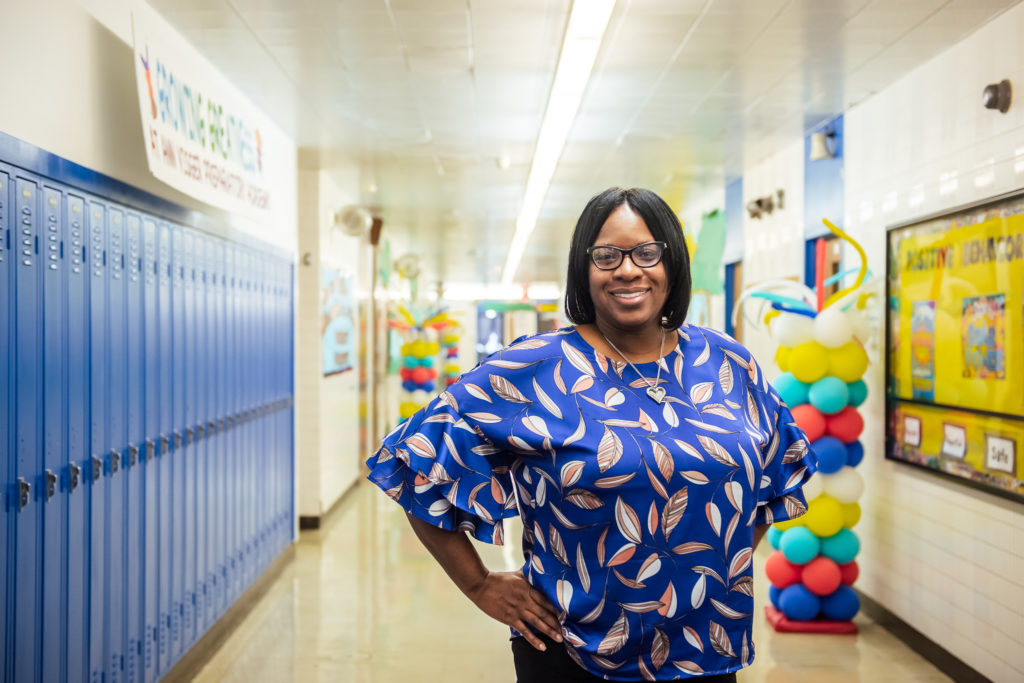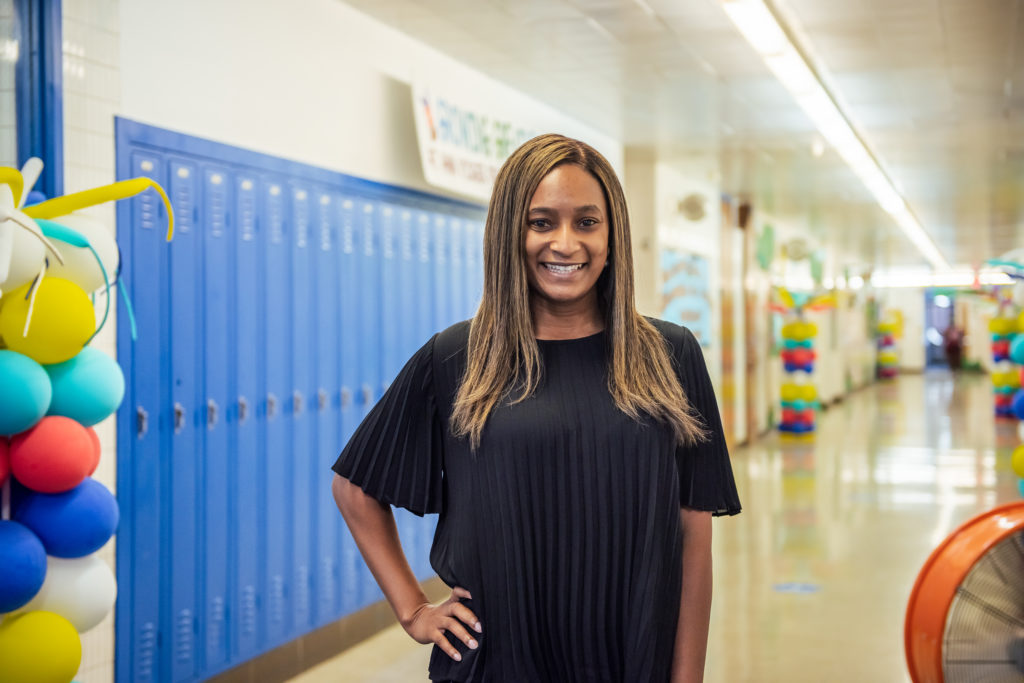Ann Visger Students Prepare to Thrive in Community Schools Environment
Published on November 3, 2021 in Education

Brenda Steele-Crumbey would do anything for her two granddaughters. Two years ago, that meant becoming their custodial guardian. Today, that means attending parent-teacher conferences for the third- and fifth-grade students at Ann Visger Preparatory Academy in River Rouge.
She takes detailed notes during the conversations with teachers and pours over progress reports. She says both girls “have grown leaps and bounds” since transferring to the district in 2019. Still, 11-year-old Ka’mara Steele struggles to pronounce some words – often growing frustrated and giving up midsentence. Selena Steele, who is 9, needs extra help with reading.
Brenda picks up a flyer from the school’s reading interventionist and adds it to her stack of schoolwork and announcements for upcoming events. “This is exactly what they need,” she says, smiling. “Finally, some help.”
The help for Brenda and her granddaughters comes courtesy of United Way for Southeastern Michigan. This fall, Ann Visger became one of five Community Schools in the region. These schools serve as a hub for the community, offering extra academic supports as well as social and emotional learning, health and wellness resources and more to benefit children and families.
United Way supports Community Schools through grant funding and the formation of strategic partnerships with corporate sponsors and community groups.
“Community Schools are truly transformative,” said Kenya Abbott Jr., program director for the United Way for Southeastern Michigan’s Community Schools initiative. “They bring together students, families, staff, and the surrounding community to provide holistic support to each student and their family to ensure they are able to thrive.”

Ka’Mara Steele (left) and Selena Steele (right) enjoy movie night at Ann Visger Preparatory Academy in River Rouge.
Fun over fear
During this year’s parent-teacher conferences, students were invited to watch “Space Jam” in the auditorium while parents met with teachers. When parents were finished, many joined their children for the movie and snacks.
With the smell of freshly popped popcorn wafting through the air while children and their parents chuckled at LeBron James dressed as Batman’s sidekick, there was none of the tension that can sometimes be associated with meetings between parents and teachers.
“We understand that some parents can have reservations about meeting with teachers based on what they’ve experienced in an education setting,” said Nichole German, principal and “chief mom” at Ann Visger. “We want to create an environment that invites them in, not shuts them out. Events make it easy and fun for parents, students and staff to bond. It creates an extended family feeling that puts everyone at ease.”
Parent engagement plays a critical role in the Community Schools model. Studies show when parents and families are actively engaged in their children’s school, students are more likely to demonstrate academic success.
“We want to make sure parents understand the connection between home and school,” Nichole said. “Students have to take the skills they learn at school and practice them at home. We help parents understand that and offer whatever additional supports they need.”
Recently, with help from United Way, parents at Ann Visger were enrolled in Ready4K, a research-based text messaging tool that helps parents make any moment a learning moment. School administrators will also be able to take advantage of the tool’s text-messaging capabilities to provide important updates to parents.

Nichole German, principal at Ann Visger Preparatory Academy in River Rouge.
Righting the ship
After eight years as principal, implementing many staff and curriculum changes, Nichole said many students were making progress. But the COVID-19 pandemic changed everything.
“In a way, it seems like we’re back at square one. But now, of course, we have United Way’s help and additional resources that can help us jumpstart our students’ success,” Nichole said.
“COVID has had a tremendous impact on our students academically and emotionally,” agreed Tiffany Moore, literacy interventionist at Ann Visger – a role made possible with United Way’s Community Schools grant. “Many have fallen behind in literacy. Right now, a lot of our students are reading below grade level. We have some on grade level and others that are almost two levels below where they should be.”
To help get things back on track, Tiffany and her colleagues will soon launch several new literacy initiatives and a schoolwide reading competition.
“We want to make literacy fun for our scholars, but we also want to push them and encourage them to grow,” Tiffany said.
Tiffany assists instructors by sharing best practices and high-level instructional strategy. Students who receive the lowest 5 percent of scores on the Northwest Evaluation Association (NWEA) assessment will receive additional targeted instruction.
Kecia Cofield, a mom to three Ann Visger students, said she is thankful for the added programs her children will have access to through the Community Schools initiative. While exiting the movie she shared the difficulties her third-grade student, Ross Cofield, has had with reading.
“Reading isn’t always easy for him,” Kecia said. “He lacks confidence. I want him to be more confident in what he can do.”
Ross takes a break from running outside with his siblings to say, “I want to be an astronaut when I grow up.”
Kecia said she is certain that the extra support will be what Ross needs to overcome his challenges and adds, “Who knows? He might be an astronaut.”

Tiffany Moore, literacy interventionist, at Ann Visger Preparatory Academy in River Rouge.
Wraparound supports
In addition to causing learning loss, the pandemic exacerbated existing issues and increased the need for wraparound services. Every Community School employs a coordinator to connect districts to partner service agencies. These partnerships support students and families in accessing resources to address their basic needs such as utility help, housing, clothing, and food assistance.
Ann Visger staff recently worked with a local optometrist to secure glasses for one student. A local dentist is also being brought in to provide students with dental exams and cleanings.
“We’re in the business of eliminating barriers,” Jason Jefferson, Community Schools coordinator at Ann Visger, said. “United Way has provided the district with great supports to help us do that.”
Nichole said the wraparound service support is critical because “sometimes our families don’t know where to go or who to ask for help.”
She said no matter the issue at home, a Community School is there to help. Since the beginning of the school year, Ann Visger staff members connected 32 students with trauma and grief resources and signed up 140 families for weekly food deliveries from Forgotten Harvest. One hundred students were given backpacks, and 10 received uniform assistance.
“We’re invested in getting our families back on their feet,” Nichole said.
“My vision is to exceed the expectations of what Community Schools look like,” she continued. “Right now, we’re striving, and we’re on our way to thriving.”